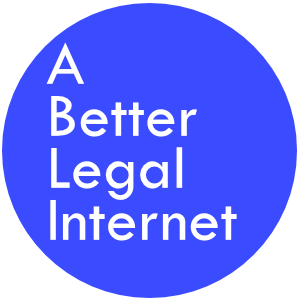— This post was originally published on Medium, in our publication Legal Design and Innovation—
One of my favorite podcasts, Reply All, has an episode out about fake-official Internet sites, that dupe people in a desperate situation with seemingly-official sites that charge people for services that should be free. For example, there’s a Lost-and-Found site for NYC taxis, that charges people a hefty fee for reporting an item they left behind in a taxi — except that the site isn’t affiliated with the taxi system, and doesn’t do anything to help the person retrieve the lost item.
This isn’t a problem just for fake-taxi system sites. It’s also a problem for government services and legal help. When people use the Internet to seek out help (like, how do I file for an immigrant visa?, how do I clean my criminal record?, or how do I respond to an eviction letter?), they often end up on sites that are trying to profit from them rather than serve them.
Search engines are increasingly the first stop for people looking for help on a question they’re trying to figure out. This applies to legal questions too. In an upcoming article I’m publishing in the Virginia Journal of Law and Technology on the Internet as a legal help service, I lay out how these Internet searches often don’t serve legal help-searchers very well. People end up on sites that are for other jurisdictions, on private sites that charge them for forms that the government provides for free, or on forums or websites that give them anecdotal and often incorrect information.
The user experience of the Internet as a legal help service is poor. Trying to find what your legal issue is, what options you have, and who can best help you is a confusing process. Current Internet search results don’t make it very easy. A long list of websites, without differentiation as to what is most trustworthy, what is official and public, and what applies to your specific case, does not serve people’s needs.

One of the main projects this year at the Legal Design Lab is Building a Better Internet for Legal Help. It’s looking at the ‘front-end’ projects that can make better websites, mobile apps, and other people-facing tools that let normal people find the right help and use it easily. It’s also creating ‘back-end’ structures that can provide the data and resources to supply these front-end tools with high-quality information.
We’ll be doing a project on building a better ‘semantic system for legal help resources’ — meaning that we can structure key information about legal issues and services into key categories. With standardized typologies — created in a way that they can easily be applied to all kinds of content on websites — the Internet can be a better place for legal help.

If information about legal help and services is not just posted online, on websites, directories, and apps — but is tagged up according to what the content is and who it applies to, then online applications (like search engines) can find it more easily.
Then, when a person is looking for a specific kind of legal help online, search engines and other applications can serve up the right content more quickly. They’ll be able to figure out the legal help issue the person is searching for, and find the right jurisdiction’s content, with the most up-to-date legal info, and coordinate that with service provider information.
We need to invest in building structure into the online wilds of legal information, so that people don’t end up on spammy or scam websites — or even end up on legitimate legal sites with information that is not for their jurisdiction or is out of date.
Our goal is to do for legal Internet searches what Google and the Mayo Clinic have done for many medical searches. Like when a person searches for Zika, Google serves up a special kind of page result — with reliable, vetted information, a guide through the key things to know, and links to more follow-up resources.

This type of search results experience is a big experience from serving up a user a long list of sites to dig through, along with ads — all leaving them wondering what is really true and what to do next.
Could this be possible for legal help searches as well? We think it can be, and we’ll spend this school year building some first prototypes of it. Here’s an early mockup of what this might look like, if someone searched online about how to clear their criminal record.

Structuring information will be the first step, and then getting help providers to use this structure will be the next one. We’ll be working with a terrific group of stakeholders to pilot a few topics of legal help into this structure, see how the schema works, and start designs on what better search results could look like too.
If you’re interested in building better back-ends and front-ends to the legal help Internet, please be in touch! We are doing this work in an open and participatory way. We would love to hear from you.
